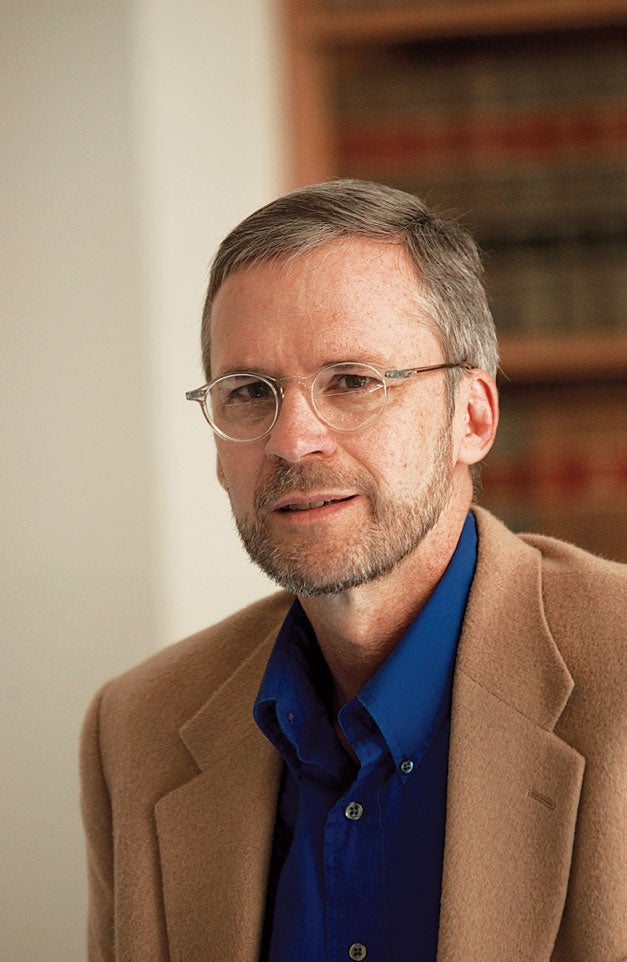The following story appears in the April 19, 2010, issue of the Weekly Standard. HLS Professor William Stuntz is an occasional contributor to the magazine.
Celebrating William Stuntz
by Erin Sheley
Legal academia is not famous for collective displays of appreciation, and even less so for the humility of its members. So the celebration of the work of William Stuntz held at Harvard Law School on March 26 and 27 was doubly extraordinary. On those two days, legal scholars and practitioners from a range of philosophical and methodological perspectives came together to express their admiration for the work of a singularly modest man.
Professor Stuntz—an occasional contributor to this magazine—is credited with signal contributions to the fields of criminal law and criminal procedure. According to University of Pennsylvania law professor David Skeel, coauthor with Stuntz of the blog “Less than the Least” and an organizer and moderator of the event, “a lot of people used to think of criminal procedure as a backwater. One theme of the conference was how the field has really taken off thanks to Bill’s work.” Stuntz’s attention to the “political economy” of criminal law—the relationship between the institutional arrangements of the criminal justice system and its outcomes—has “transformed the field,” according to Richard McAdams of the University of Chicago Law School.
While a symposium examining the influence of a single scholar is not unheard of, such gatherings are rare. But Stuntz, who has suffered from acute chronic pain for years, is now also fighting cancer, and his meditations on faith, living, and dying on the blog have attracted a wide following. Thus, the Harvard conference, in addition to its focus on legal scholarship, was personal for its participants, many of whom were colleagues, mentors, former students, and scholarly interlocutors of Stuntz.
The first session addressed Stuntz’s work on the problems caused by the structure of the criminal justice system. McAdams showed how legal scholars previously failed to examine the function of police, prosecutors, and other players in the system as “agents” of the citizens—a relationship that has been studied at length in the context of corporate law, with respect to executives and shareholders. Stuntz began to fill this gap. In his 2001 article “The Pathological Politics of Criminal Law,” for example, he argued that the breadth and severity of criminal justice derives not from the electorate but from their agents, who are motivated by predominantly institutional politics. Particularly powerful, he argued, are the incentives, flowing from prosecutorial discretion, that motivate legislators to broaden liability rules, which in turn yields yet further prosecutorial discretion.
His Harvard colleague Carol Steiker, who has taken a particular interest in capital punishment, discussed Stuntz’s notion of the “one way ratchet” in criminal justice—his insight that criminal liability is ever-widening, and sentences ever harsher, because of the political and other incentives of the actors in the system as it is currently configured. Steiker observes that the answer to this problem “should not be to limit discretion but rather . . . to have a normative discussion about good versus bad discretion, which is where the idea of mercy comes in.” The concept of mercy, Steiker argues, offers a possible solution insofar as it invites consideration of “whether to punish when one has a choice.”
Especially striking at the conference was the question of what it is that makes Stuntz’s work so compelling to vastly disparate camps in the legal academy. David Sklansky of Berkeley, citing Orwell on Dickens, observed that “everyone wants to claim him.” Stuntz’s ideas resonate with Burkean skeptics who admire his acknowledgment of systemic complexity; with traditional liberals who appreciate his concern for over-incarceration and racial disparity in the criminal justice system; with “law & economics” scholars who value the empirical foundations of his work; and with law-and-order conservatives for his support of strong policing. McAdams says, “It is difficult to get academics to agree on anything, especially on politically charged matters such as criminal law and procedure. [Stuntz’s] work is just so good—original, empirically grounded, and large-scale—that it defies preexisting categories and compels respect.”
During his presentation Sklansky noted that Stuntz’s work builds a bridge between the religious and the secular, the pragmatic and the evangelical, with his intellectual commitments both rooted in faith and insistent on reasoned evidence. In the world of criminal legal discourse, this is an invaluable contribution. Stuntz himself described the conference as dispelling a common misconception about the scholarly life as isolated. Scholarship, he says, is “actually done in the company of other people who have written; there is a conversation going on.” The Harvard conference provided “a rare treat to have that conversation take place out loud.”
Beyond Stuntz the scholar, however, the gathering was a homage to Stuntz the human being. It is significant that every single person invited came. After the three sessions on criminal law, a final session was devoted to reflections by mentors, colleagues, and students. Dana Mulhauser—an attorney at the Department of Justice and a former student of Stuntz’s—noted the beauty of one of his famous phrases: “I hadn’t thought of that.”
